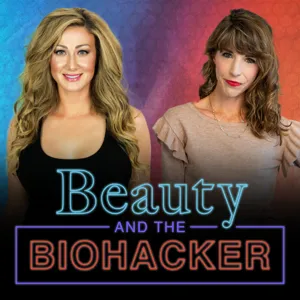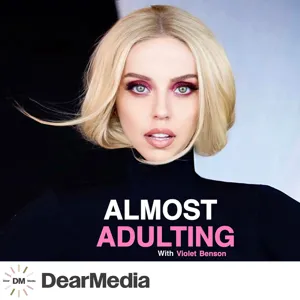Podcast Summary
Dismantling external beauty standards and embracing inner confidence: Inner qualities and self-worth are more valuable than external appearances, creating a safe space to share and validate personal struggles promotes emotional wellbeing.
The episode talks about the narrator's vulnerability and feeling ugly due to external beauty standards and personal flaws. The discussion explores the impact of societal influences on emotional wellbeing, low self-esteem, body dysmorphia, social comparison, and negative learning experiences. The narrator shares a personal conflict of feeling hypocritical and guilty for caring about looks in a world experiencing body positivity and diversity. The takeaway is that inner thoughts and self are more valuable than external appearances. The discussion concludes with a positive counterbalance to negative beliefs by emphasizing that our positive qualities outweigh physical flaws. The episode fosters a safe space for listeners to relate and feel less alone through honest and transparent conversation.
Overcoming Ugly Feelings: Mental Tools for Challenging Beauty Standards: To overcome feeling ugly, challenge negative thoughts, shift focus, practice self-compassion, and limit exposure to unrealistic beauty standards. Prioritize self-acceptance and self-love over seeking validation from others.
Feeling ugly can be linked to mental phenomena like the spotlight effect and the false consensus effect, where we overestimate how much others notice and hold the same beliefs as us. This feeling would be eliminated if we didn't care about others' evaluations, but evolution has wired us to prioritize physical attractiveness for survival, leading to unrealistic beauty standards. To overcome these feelings, we can challenge negative thoughts, shift our focus, practice self-compassion, and limit exposure to unrealistic beauty standards, among other mental tools. It's important to recognize the impact of societal expectations on body image and prioritize self-acceptance and self-love, instead of seeking validation from others.
The impact of gender socialization on women's self-perception: Societal beauty standards and constant exposure to unrealistic media fuels negative self-perception and social comparison. Challenging cultural messages is crucial for promoting positive self-worth.
Gender socialization from a young age reinforces the idea that a woman's value lies in her physical appearance, leading to negative self-perception and anxiety about looks. Societally ingrained beliefs about attractiveness and worth are tied to subjective self-perception and constantly changing standards and features. Social comparison fueled by frequent exposure to unrealistic media can negatively impact self-esteem, particularly when engaging in upward social comparison. It takes a lot of effort to not care about looks in a society that puts it front and center. It's important to recognize and challenge these cultural messages to promote positive self-perception and self-worth.
The Impact of Social Media on Self-Esteem and The Influence of Childhood Experiences: Early experiences shape adult self-esteem, negative self-perceptions through social media can worsen self-esteem, but it's possible to develop a positive self-image based on our own worth.
Exposure to social media and its emphasis on appearance leads to the internalization of standards and self-objectification, causing negative self-perceptions regarding appearance and lower self-esteem. Childhood experiences and interactions significantly impact adult self-esteem, with positive experiences fostering a healthy sense of self-worth and negative experiences leading to feelings of inadequacy. Over time, self-esteem becomes ingrained, and low self-esteem can result in self-criticism, self-doubt, and feelings of ugliness or unattractiveness. It's important to be aware of these influences and work towards developing a positive self-image based on our own values and worth rather than external validation through social media or other means.
Understanding Body Dysmorphic Disorder: Body dysmorphic disorder causes an obsessive focus on perceived flaws and can cause distress and impairment in daily functioning. Seeking professional diagnosis and taking time for self-reflection can lead to freedom from these thoughts and feelings.
Body dysmorphic disorder is a psychological disorder that leads to obsessive preoccupation with perceived flaws, distorted perception of appearance, and excessive focus on minor or imagined defects. This condition can impact anyone and often leads to distress and impairment in daily functioning, such as avoiding certain activities, negative thought spirals, and anxiety. Seeking professional diagnosis is crucial for proper treatment and therapy. While there are contributing factors, feeling constantly unattractive and obsessed with appearance can strip enjoyment from life and lead to feelings of frustration, anxiety, and general apathy. To counter and overcome feeling ugly, taking time for self-reflection and reinforcing the inherent belief that looks do not determine worth can provide freedom from these thoughts and feelings.
Our appearance doesn't define us: Society often overemphasizes the importance of appearance, but we shouldn't be too hard on ourselves. Instead, we should focus on self-improvement and surround ourselves with positive influences.
Our appearance doesn't matter as much as society often makes it seem, and no one is scrutinizing us as closely as we scrutinize ourselves. We should ask ourselves if we spend hours of the day thinking about someone's flaws and looks. If not, then why do we think people are doing the same for us? We shouldn't care about the opinions of those who spend their lives thinking about our flaws. It's important to focus on our own self-growth, becoming our best selves, and living our purpose. We can gain the tools we need from various resources like podcasts, therapy, and conversations with healers and experts. We must learn to shut down the nasty parts of our brain that try to tell us our appearance is all that matters.
The Value of Inner Qualities in True Beauty: True beauty is rooted in unique qualities, not physical appearance. Challenge negative thoughts about appearance and focus on developing skills and pursuing passions to cultivate a sense of self-worth based on character and accomplishments.
True beauty lies beyond physical appearance and is rooted in the qualities that make you unique. Your worth and value as a human being should not be determined solely by how you look. Challenge negative thoughts about appearance by becoming aware of negative appraisals and replacing them with realistic and positive beliefs. Shift attention away from appearance and place more value on inner qualities by developing skills, pursuing passions, and engaging in activities that cultivate a sense of self-worth based on character and accomplishments rather than appearance. Challenge the validity of negative thoughts about appearance and consider alternative rational perspectives.
Practicing Self-Compassion and Finding Support to Improve Self-Perception: Be kind to yourself and limit exposure to harmful media. Engage in activities that make you feel accomplished, and seek professional help if necessary. Prioritizing mental and emotional well-being over appearance is important for improving self-esteem.
Practicing self-compassion is important when countering negative thoughts about appearance. We can treat ourselves with kindness and self-acceptance, as we would a friend or our inner child. Surrounding ourselves with positive influences and supportive people helps reinforce a positive self-perception. We can also limit exposure to harmful beauty standards by being mindful of the media and content we consume. Engaging in activities that make us feel accomplished or cultivating new hobbies diverts our energy from negative self-talk and improves self-esteem. Seeking professional support is also valuable if negative feelings persist. Overall, prioritizing our mental and emotional well-being over appearance is important, and therapy can provide perspective and support.
Seeking Support for Body Dysmorphic Disorder: Seek professional help and talk to understanding friends or professionals. Prioritize what really matters, share experiences, and create a positive impact regardless of physical appearance.
Body dysmorphic disorder and similar conditions require clinical guidance and medical assistance to relieve associated fears and worries. Expressing our thoughts and feelings in a judgment-free space and talking to friends or professionals who understand can help lift the burden. While it's okay to feel unattractive or focus on our appearance, we need to strive for a broader perspective and prioritize what really matters, such as treating people well, creating memories, and enjoying life. We are not alone in our struggles, and sharing our experiences can validate and help others who may be feeling the same way. Looking back on our lives, we want to know that we made a positive impact, regardless of our physical appearance.






